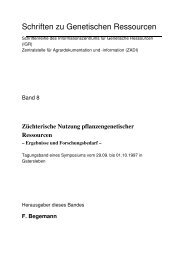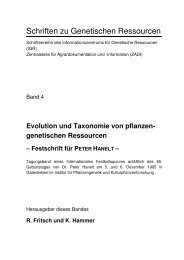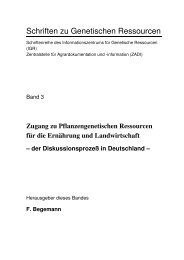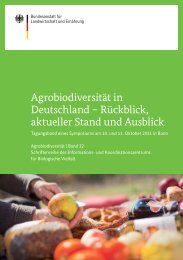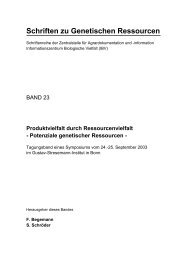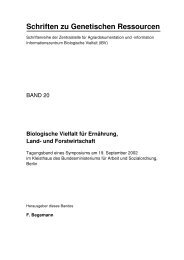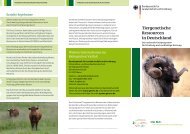Integration of Conservation Strategies of Plant Genetic ... - Genres
Integration of Conservation Strategies of Plant Genetic ... - Genres
Integration of Conservation Strategies of Plant Genetic ... - Genres
You also want an ePaper? Increase the reach of your titles
YUMPU automatically turns print PDFs into web optimized ePapers that Google loves.
farmers willingly partake <strong>of</strong> their seeds or plants with us and in addition we obtain a lot <strong>of</strong><br />
informations about traditional cultivation, usability <strong>of</strong> different plants as food, medicine or<br />
resistance against pests and insects e.t.c.Such informations can be used in ecological programmes.<br />
Therefore, first <strong>of</strong> all we must collect as soon as possibie the germplasm in mentioned farms. In<br />
a few years, when old farmers will die, this rich source <strong>of</strong> genetic resources will be irretrievable.<br />
Besides, close contacts have been made with certain non-governmental organizations such as:<br />
Allotment Garden Association, Polish Horticulture Society, Polish Botanical Society, National<br />
Fundation <strong>of</strong> Environment Protection, Advisory Agriculture Centre and also with private<br />
producers. These institutions play very important role in popularization <strong>of</strong> germplasm<br />
conservation and the possibilities <strong>of</strong> their utilization. Different specialists belong to these<br />
organizations provide us many valuable informations about history <strong>of</strong> plants, ecogeographical<br />
survey <strong>of</strong> species distribution et.c.<br />
Owing to good cooperations with foreign institutions and specialists (IBPGR/FAO, VIR, other<br />
gene banks et.c.) we have possibilities to participate in international scientific missions (Syberia,<br />
Central Asia, Israel), in conference, trainings and also helps to exchange materials and<br />
informations.<br />
The curator <strong>of</strong> vegetable crops collection is a member <strong>of</strong> Allium Working Group within IBPGR<br />
and data on our collections are included into European Data Base<br />
<strong>Genetic</strong> resources utilization<br />
The conservation <strong>of</strong> plant germplasm is the best guarantee that in future, breeders and other<br />
scientists, will have working material available to them.<br />
Interest in gene bank materials has been increasing lately, mostly from breeders, agricultural<br />
universities, other universities, research institutes, botanical gardens, seed and breeding<br />
companies, experimental breeding stations, and also private producers. Gene bank collection is<br />
the main base <strong>of</strong> initial material and suggestions for research work useful for practical breeding.<br />
Besides, the materials from gene bank are examined by breeders and the results <strong>of</strong> the examination<br />
are included to the data base in the gene bank. Breeders are interested in utilizing germplasm wild<br />
and cultivated, which <strong>of</strong>fers great potential value for breeding. The plant breeders look to plant<br />
germlasm as a source <strong>of</strong> high cold or drought tolerance, more effective photosynthesis in lower<br />
temperature, tolerant to air or soil pollution, resistant to pathogens et.c. Collected accessions can<br />
be used to rebuildsuch the quality characters as taste, flavour, and other nutrient compounds<br />
which are lost sometimes during <strong>of</strong> intensive breeding works.<br />
The accessions maintained in field collection are used by students <strong>of</strong> agricultural universities or<br />
agricultural schools to prepare thesis or for didactic aims. The results <strong>of</strong> these studies also enlarge<br />
data base <strong>of</strong> given accessions in gene bank.<br />
In 1993 474 samples <strong>of</strong> 17 species <strong>of</strong> vegetable crops and 19 wild species, were distributed in<br />
Poland. 57 samples <strong>of</strong> 26 species <strong>of</strong> vegetable crops where sent abroad. From Poland we received<br />
205 samples <strong>of</strong> 11 species and from other countries we recived 62 samples <strong>of</strong> 5 species. During<br />
3 short explorations in Poland have been gathered 95 accessions <strong>of</strong> 21 species.



